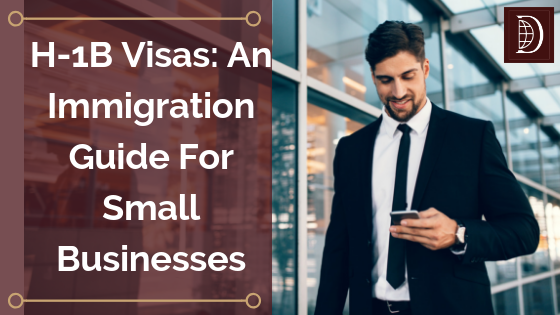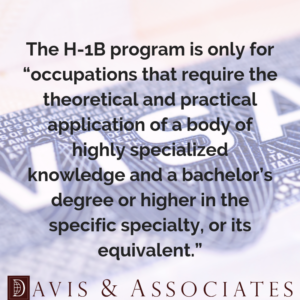
H-1B Visas: An Immigration Guide For Small Businesses
As a small business owner, you’re always on the lookout for highly qualified help – people who can propel your company forward.
But what if you’re just not finding those job candidates here, in the U.S.?
In some cases, small businesses can hire their ideal candidates from outside the U.S. using the H-1B visa program. For most companies, it makes sense to work with a Houston immigration attorney when it’s time to employ foreign workers in specialty occupations.
What is the H-1B Visa Program?
The H-1B visa program is for companies in the United States that want to temporarily employ foreign workers – but it’s not for every company. According to U.S. Citizenship and Immigration Services, the H-1B program is only for “occupations that require the theoretical and practical application of a body of highly specialized knowledge and a bachelor’s degree or higher in the specific specialty, or its equivalent.”
Companies that could qualify to use this program are involved in fields such as engineering, science and information technology, or other fields that require highly specialized workers.
[youtube https://www.youtube.com/watch?v=8XRfGRloXZo]
How Long Can Workers Stay on an H-1B Visa?
Workers who come into the U.S. under this program can stay for up to 3 years. The initial time period can often be extended, if necessary, but the visa generally can’t last for more than a total of 6 years. During that time, the worker may be eligible for other types of immigration benefits or a change of status.
H-1B Specialty Occupations
If your company wants to use the H-1B visa program, the job you’re offering must meet one of these criteria:
- A bachelor’s degree (or its equivalent) or higher is the normal minimum entry requirement for the position.
- The job is so complex or unique that it can only be performed by a person with a degree, or the degree requirement for the job is standard in the industry.
- The employer usually requires a degree or its equivalent to fill the position.
The person you want to hire must meet these criteria:
- He or she has a U.S. bachelor’s degree or higher degree that matches the occupation, and the degree is from an accredited college or university.
- He or she holds a foreign degree that’s equivalent to the one necessary for the job.
- He or she has an unrestricted state registration, or certification which authorizes the practice of the specialty occupation, and he or she is engaged in that specialty in the state of intended employment.
- He or she has the training, experience or education necessary to be considered equivalent to a degree in the field.
H-1B visas are also available to Department of Defense researchers and development project workers, as well as fashion models.
Fashion Models
In order for a company to take advantage of this program for fashion models, the position or services must require a prominent model. The model must be, according to USCIS, “a fashion model of distinguished merit and ability.”
Who Can Sponsor Applicants in the H-1B Visa Program?
Only employers can sponsor people on H-1B visas. Nobody can “self-sponsor.” If a person wants to come to the U.S. using this program, he or she must get a job offer from a U.S. employer first; then, the company can file a petition on that person’s behalf.
Companies can’t file applications to be part of the program and then find employees later, either. Every petition must be on behalf of a specific person.
The H-1B Visa Application Process
Sponsoring applicants is a three-step process that an employer can only begin when it has found a prospective employee to hire.
Step 1 in the H-1B Visa Application Process
The employer must first file a Labor Condition Application, or LCA, to the U.S. Department of Labor. The DOL must approve the form before the employer can file to sponsor a worker with USCIS.
Step 2 in the H-1B Visa Application Process
When the Department of Labor approves the LCA, the employer may file a petition to sponsor a worker with USCIS. The petition has to include the LCA.
Step 3 in the H-1B Visa Application Process
The prospective employee can apply to the Department of State to prove his or her qualifications for the visa. He or she also needs to apply to U.S. Customs and Border Protection for admission under an H-1B visa.
What is the Labor Condition Application?
A Labor Condition Application, or LCA, is a document that all prospective H-1B employers must file with the Employment and Training Administration, which is an agency within the U.S. Department of Labor. An employer has to file this form when it wants to employ nonimmigrant workers for specialty jobs, and it includes standards that the employer agrees to uphold, such as working conditions and undertaking a good faith effort to find U.S. employees.
Under federal law, the LCA must be certified by a Department of Labor official before you can use it to file a visa petition.
The H-1B Cap: Only So Many of These Visas Are Issued Each Year
The number of immigrants allowed to come to the U.S. to work in specialty occupations is subject to change. However, the cap is currently at 65,000. While there are some waivers available, and some people are still allowed to come to the U.S. under the H-1B visa program after the cap has been met, exceptions are rare. Typically, exemptions are available for the first 20,000 people who have earned a U.S. master’s degree or higher; this is called the “advanced degree exemption.”
USCIS typically hits the cap early in the year. According to the agency’s website, USCIS reached the cap for fiscal year 2019 on April 6, 2018.
Institutions of higher learning that petition for H-1B visa workers aren’t subject to the cap. Neither are nonprofits or affiliates of colleges and universities, or nonprofit research organizations. Government research organizations aren’t subject to the cap, either.
Can an H-1B Visa Recipient Bring His or Her Family?
In many cases, H-1B workers can bring their families with them under a different type of visa. The H-4 nonimmigrant visa is available to spouses and unmarried children under the age of 21. These family members are admitted – if they meet the eligibility criteria – for the same time period that the H-1B worker is admitted.
Typically, H-4 nonimmigrant visa holders are not authorized to work in the U.S. However, some dependent spouses can file an application for employment authorization with USCIS.
H-4 family members can generally attend school in the U.S. under their own visa’s conditions.
How to Sponsor a Worker Under the H-1B Visa Program
USCIS isn’t continually accepting applications for workers under this program – there’s a filing window. Your attorney can give you guidance about when it’s appropriate to file. Your best bet is to begin the process early, including completing your paperwork ahead of time, so you can file as soon as the window opens.
You’ll need to:
- Notify your employees you’re seeking to employ H-1B nonimmigrants. The law requires you notify your employees by a hard copy notice or electronically.
- File the Labor Condition Application.
- File Form I-29 after your Labor Condition Application has been approved. Your attorney can ensure that you have all the right supporting documents and that your form is filled out correctly.
- Wait for a decision. You can check your prospective employee’s status online here, provided that you have a receipt number.
Your company is responsible for paying all the application costs. You’re also responsible for providing support to your new employee and his or her family, once he or she is approved, during the transition – not financially, other than the salary or wage you pay, but through the difficulties of becoming accustomed to a new culture, getting driver’s licenses, or enrolling in school. You can’t just assume that your employee will figure it all out on his or her own.
What You Have to Prove When You Apply
When you apply to sponsor a worker through the H-1B visa program, you’ll have to show that you can pay your employee and that you’ll have a bona fide employer-employee relationship.
Paying Your Employee
You’ll need to prove that your company has enough money set aside to pay your new employee for at least a year.
The Employer-Employee Relationship
You’ll need to prove that your employee will be the employee and you’ll be the employer. You may need to furnish an employment contract.
Do You Need to Talk to a Houston Immigration Lawyer About the H-1B Visa Program?
If you want to sponsor workers through the H-1B visa program, we can help you navigate the bureaucratic process and help ensure everything goes smoothly.
Call our team of Houston immigration lawyers to learn more through a free consultation now. We’re available at (832) 742-0444, or, if it’s easier, you can contact us online to discuss the H-1B visa program and how it can help your business.
About Davis & Associates:
Davis & Associates is the immigration law firm of choice in Houston and surrounding areas. Their attorneys provide expert legal counsel for all aspects of immigration law, including deportation defense, writs of habeas corpus and mandamus, family-sponsored immigration, employment-sponsored immigration, investment immigration, employer compliance, temporary visas for work and college, permanent residence, naturalization, consular visa processing, waivers, and appeals. Attorney Garry L. Davis is Board Certified in Immigration and Nationality Law by the Texas Board of Legal Specialization.
Contact Info:
Davis & Associates
Address: 654 North Sam Houston Pkwy E #100, Houston, TX 77060
Phone: (832) 742-0444
